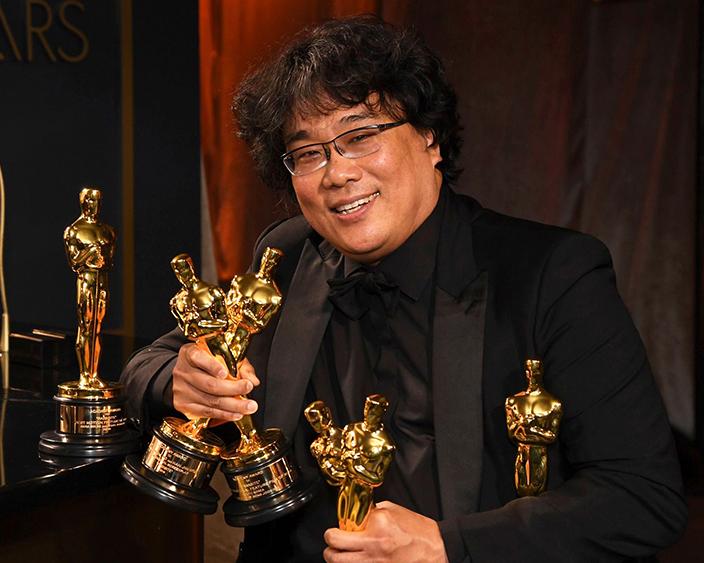On Feb. 10, Bong Joon-ho’s highly-acclaimed thriller film “Parasite” took the spotlight at the 92nd Academy Awards. By honoring a foreign-language film with an all-Korean cast six nominations and four prizes for Best Picture, Best Director, Best Foreign Language Film, and Best Original Screenplay, the Academy ultimately rewrote the prospects of the Western film industry and its inclusivity once and for all. The recognition of Bong’s magnum opus was more than just a memorable first-time experience for international language films; it was arguably a formative cultural, racial, and artistic milestone that broke the barriers of membership in Hollywood.
Bong has hitherto secured a heavy role as a distinguished, record-breaking director through his other internationally-acclaimed works such as “Okja,” “The Host,” and “Memories of Murder.” Undoubtedly, though, “Parasite” was his biggest hit yet, with unprecedented success on the global stage. Therefore, the movie’s culmination of winning an Academy Award, breaking the record as a non-English film for best picture, was a climactic event enjoyed not only by Koreans but also by many Asian-Americans who have long been pushing for increased Asian representation in the media.
“Parasite” has become the first step in the Academy’s journey to endorsing diversity, as well as marking a shift in embracing more politically-charged films, serving as an exemplary critique of class warfare that fared well to the international audience due to the subject’s universality. This iconic recognition has led the global film community to revisit the #OscarsSoWhite campaign in 2015 that labeled the Academy as a notorious council over-representing white directors and actors, its controversy of white privilege peaking with the selection of white-cast films. This denomination has officially dropped with “Parasite,” as its recognition as a token of promise to promote ethnic inclusivity and honor films outside of the Western film industry henceforth.
But there is more to the “Parasite” success story than a solo record-breaking performance; the public’s reaction to its success has been a telling reflection of the society’s lasting divide on interracial and interlingua transitions of a white-dominated industry. For one, everyone had something to say about “Parasite,” mainly searching for a defining reason as to why it was so special and exceptionally “deserving” of an Oscar than any other foreign-language film.
In truth, it wasn’t. Granted, “Parasite,” though a self-evident masterpiece, alone could not have broken the long-standing ethnic hurdles of Hollywood; its laudable performance was not created in a vacuum. Rather, it was the legacy of the entire Korean film industry that became a pedestal for “Parasite” to succeed –– a buttress that the film could not have fared so well without. Korea’s fast-growing film industry is not new to global recognition. Ranked 5th largest in the word, it has been consistently climbing the charts with movies equally as gripping as “Parasite,” such as “Extreme Job,” “Old Boy,” or the sexist taboo-critique of “Kim Ji-young, Born 1982.”
If the film industry were to give a reason for “Parasite’s” success other than its own artistic value, then the spotlight should be on this climactic and rigorous build-up. Instead, we saw a hesitant receptivity toward the film’s success composed of many reservations, such as President Trump’s criticism on the selection of an “un-American” film, American sportscaster Jon Miller’s wry tweet that rendered Bong’s mostly Korean acceptance speech the “destruction of America,” and social media taking the breakthrough with a grain of salt. Some, in fact, accused the Academy of having ulterior motives of clearing its racially conservative name with “Parasite” or using the film as an indignant response to Bong’s comment, “the Oscars are not an international film festival. They’re very local.”
With its prominence and magnitude, the Academy should have met its proportionately high stakes much earlier for the prioritization of the value of art and the closure of racial domination, overcoming the “one-inch tall barrier of subtitles” that Bong once remarked of. Yet, this belated transition has branded white-dominated films and the lingua franca exclusivity with gold ribbons of recognition that consolidated a set image of what an “Oscar-endowed” movie looks like. Such uneven exposure has come to head in stirring a defensive reaction when “Parasite” came to join the picture, marked as something so unfamiliar and unsettling that the media was quick to undercut its success. This ultimately brings to light the manifest ethnic conditioning that media subjects us to, fixating a Western-dominated representation of many of our industries. “Parasite” was a wake-up call, not only with its immediate criticism of class divide but also in blowing the whistle on our deeply entrenched disillusionment and reinstating an agenda of giving the recognition the minorities of any industry deserve.

